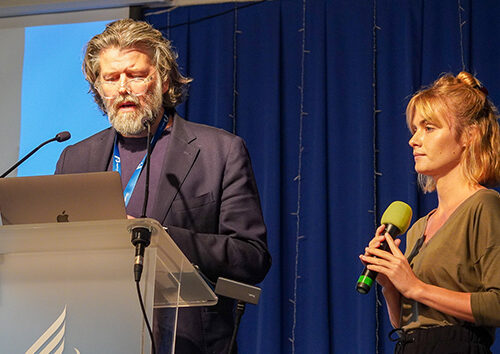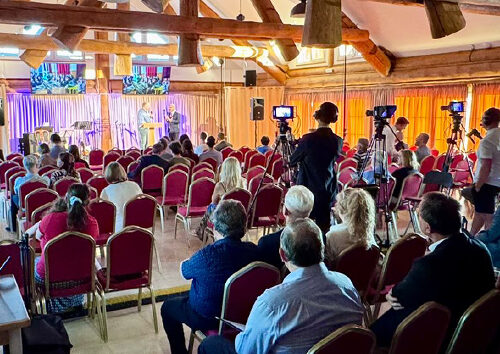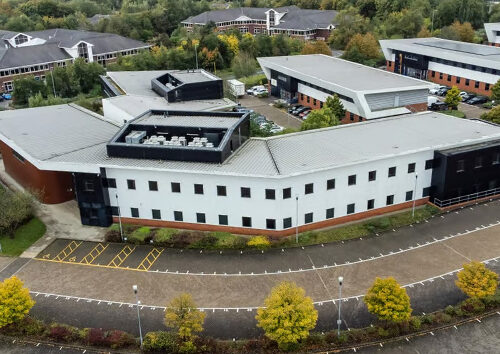16 September 2016 | Riga, Latvia [Andrew McChesney /AR/ tedNEWS] Over the weekend of 16 and 17 September, Latvia’s 4,000 Adventists are remembering their heritage and looking to the future as they review their 120-year history. In a weekend filled with music, memories, and even an ordination service of two pastoral families, three stories, from the past and the present, make a strong impression.
 The 95-year-old woman’s announcement surprised Latvian pastor Armands Bērziņs.
The 95-year-old woman’s announcement surprised Latvian pastor Armands Bērziņs.
The woman, Pauline Auniņa, told him that she wanted to turn a two-story house into an Adventist church in Latvia’s capital, Riga, and presented him with pre-World War II ownership papers for the building.
The year was 1991, and newly independent Latvia was preparing to restore private property rights. The authorities intended to return Soviet-seized property to people with ownership documents.
Auniņa had those papers, Bērziņs said. She had been holding onto them since 1972, when the building’s original owner, Anna Terauds, had made the dying wish that her house be transformed into an Adventist church.
 “She had a dream that the red, white and red-striped flag of independent Latvia would once again fly on the streets of Riga,” Bērziņs said.
“She had a dream that the red, white and red-striped flag of independent Latvia would once again fly on the streets of Riga,” Bērziņs said.
Bērziņs had never attempted to reclaim property before, but he was willing to try.
“I thought, ‘Why not?’” he said, a slight smile creasing a kindly, well-lined face. “It took a lot of time and many documents, but we finally secured the property.”
The account of how a house become a church is among the stories of faithfulness that Latvia’s 4,000 Adventists were remembering this weekend as they celebrated the Adventist Church’s 120th anniversary in this Baltic country of 2 million people.
“I am happy to say that the first Adventist church in the Russian Empire was in Latvia,” said Vilnis Latgalis, president of the Adventist Church in Latvia. “It’s a joy to celebrate this anniversary.”
German-speaking Adventists first brought the church’s message to Riga in the late 19th century, and the first church was established in 1896, he said.
 1896 also was the year that Pauline Auniņa was born. A longtime Adventist, she became the hope of Anna Terauds, another faithful Adventist, when Terauds decided to leave her former house to the Adventist Church, local church leaders said. Terauds had tucked away her ownership papers for the house after the Soviet authorities seized it.
1896 also was the year that Pauline Auniņa was born. A longtime Adventist, she became the hope of Anna Terauds, another faithful Adventist, when Terauds decided to leave her former house to the Adventist Church, local church leaders said. Terauds had tucked away her ownership papers for the house after the Soviet authorities seized it.
Terauds wanted to give the building to the church when she died, but no such will could be drafted because the Soviet authorities didn’t recognize the ownership of private property. So she signed a will that simply said she was leaving all that she owned to Auniņa. She also passed the ownership papers to Auniņa.
 When Latvia became independent, Auniņa took the papers to pastor Bērziņs over the objections of her own children and grandchildren, who were not church members and wanted to keep the property in the family, said Bērziņs, now retired. He spoke in an interview in the building, where he now lives in an apartment on the upper floor.
When Latvia became independent, Auniņa took the papers to pastor Bērziņs over the objections of her own children and grandchildren, who were not church members and wanted to keep the property in the family, said Bērziņs, now retired. He spoke in an interview in the building, where he now lives in an apartment on the upper floor.
The ground floor was converted into a church meeting hall and construction work started on a new wing with a 70-seat sanctuary. Auniņa died in 2000 at the age of 104, four years before the sanctuary opened.
“Her dream was fulfilled even though she didn’t live to see it,” said Andris Pešelis, pastor of Riga’s Seventh-day Adventist Church No. 7, which is located in the building.
“She was commended for her faith but did not receive what had been promised,” he said, paraphrasing Hebrews 11:39. https://www.youtube.com/watch?v=mqe3y1YI2Mo
Sisters Hid Jewish Teen
 Among those attending the 120th-anniversary celebration was Lidija Kleimanis, whose late husband, Ysack Kleimanis, survived the Holocaust because of the faithfulness of two Adventist sisters.
Among those attending the 120th-anniversary celebration was Lidija Kleimanis, whose late husband, Ysack Kleimanis, survived the Holocaust because of the faithfulness of two Adventist sisters.
“He was such a hard worker. He never took a vacation during the 50 years of our marriage,” Kleimanis said in an interview after Sabbath worship services.
Ysack Kleimanis was 17 when German forces seized Latvia during World War II. His mother tried to prevent the soldiers from taking the teen away to be shot by falsely claiming that he was 14, said Pešelis, a longtime friend and a church historian. The soldiers checked his documents, which said he was born in 1924, but then apparently took pity on the mother and sent him to work on a farm outside Riga that produced food for the German army.
After a while, Kleimanis and a friend decided to flee the lightly guarded farm and return to Riga.
 They found shelter with a former babysitter that first night, but she had no place to hide them and turned to her friends, Adventist sisters Eugenia and Katrin Apogas. The Apogas sisters also had little room in their one-room apartment, but they took in Kleimanis and his friend.
They found shelter with a former babysitter that first night, but she had no place to hide them and turned to her friends, Adventist sisters Eugenia and Katrin Apogas. The Apogas sisters also had little room in their one-room apartment, but they took in Kleimanis and his friend.
With police carrying out surprise house inspections regularly, Kleimanis and his friend spent daylight hours walking the streets of Riga. But the Adventist sisters decided it would be safer for Kleimanis to stay at home after police caught his friend one day.
Kleimanis spent 42 months in the apartment reading the Bible, listening to the prayers of the sisters, and becoming acquainted with the Adventist faith, Pešelis said.
He also had several close calls. One time police officers pounded on the door.
“Are you hiding any Jews?” an officer asked when the sisters opened the door.
The women didn’t want to lie, so one of them replied. “Come see for yourself.”
The officers marched into the apartment, looked around, and marched out.
“What they didn’t realize was that Ysack was standing behind the front door,” Pešelis said.
Another time Kleimanis had a terrible toothache and went to the dentist. As he sat in the dentist’s chair, waiting for the dentist to arrive for treatment, several police officers barged into the room. They looked straight at him but left.
“Ysack later said that he didn’t know what they saw,” Pešelis said. “He knew that they had looked directly at him, but they went away.”
Kleimanis lost all of his relatives in the war. He saw several of them killed, including a sister and her baby, shot with a single bullet. He found a new family in the Adventist Church, Pešelis said.
 Kleimanis was baptized in 1949, four years after the war ended. He married in 1953 and two years later became the pastor of Riga’s Adventist Church No. 7, which met at a different location than today.
Kleimanis was baptized in 1949, four years after the war ended. He married in 1953 and two years later became the pastor of Riga’s Adventist Church No. 7, which met at a different location than today.
The authorities looked unkindly on his work and stripped him of his minister’s license in 1962 after he helped open Adventist churches in Belarus and Russia. Unable to hold a regular job because of his Sabbath convictions, he joined a group of other Adventists in collecting resin from trees in the forest for the next six years.
The authorities returned his pastor’s license in 1968, and he went on to lead churches in several Latvian cities until his retirement in 1984. He met British Queen Elizabeth II when she first visited Latvia in 2006.
“He had an opportunity to witness to her about his life and values,” Pešelis said.
Kleimanis died in 2007 at the age of 83.
“He never served in church administration, but it is more important to be a child of God than to hold high office,” Pešelis said. “He is remembered by a generation of Adventists as a pastor and trusted servant.” https://www.youtube.com/watch?v=Gr2o55acsUk
First Adventist Institution
 Celebrating 120 years is not only about looking to the past but also toward the future, church leaders said.
Celebrating 120 years is not only about looking to the past but also toward the future, church leaders said.
Last May, the church established its first institution in the country with the opening of a 40-bed nursing home in Zilaiskalns, a town located about two hours by car from Riga. The Zilaiskalns Nursing Home, which cost about $100,000 to open, is something like a retirement community with short- and long-term care and an option to stay for a short vacation. It has a waiting list of people — half of whom are church members — wanting to get in, said Madara Daukste, ADRA’s country director for Latvia. ADRA runs the nursing home together with the Adventist Church.
“The Adventist nursing home offers something completely different from state-run nursing homes,” Daukste said Friday. “We can offer medical help as well as spiritual help.”
Adventist doctors provide medical treatment, while patients can attend evening fellowship services, prayer meetings on Friday nights, and church services on Saturdays, Daukste said. In addition, the nursing home offers activities that are important to Latvian culture, such as mushroom- and berry-picking outings that local residents can join.
The nursing home itself is a 12-year project that reflects the faithfulness of church members and God, Daukste said.
Zilaiskalns town leaders originally gave the property to church members some years ago to use in an outreach program in a community struggling with alcoholism and unemployment. But the church didn’t have money to repair the rundown building. As the years passed, the local families grew stronger, and the program was no longer needed.
 “So we thought, ‘What should we do with the building?’” Daukste said.
“So we thought, ‘What should we do with the building?’” Daukste said.
Around this time, a church member came across Isaiah 46:4, which says, “Even to your old age, I am He, and even to gray hairs I will carry you! I have made, and I will bear; even I will carry, and will deliver you” (NKJV).
“He was like, ‘OK, let’s build a nursing home,’” Daukste said.
The process was difficult, but church members “have been assured and reassured that this was the right thing to do,” she said.
The church member who found the Isaiah passage once was thinking dejectedly about the project as he took a ship to Sweden to find extra work, Daukste said. While on board, his cell phone rang. The stranger on the other end said: “My husband and I really want to stay in your nursing home. We have saved some money, and we are going to give it to you. Its 400 euros. Put us on the list for a vacation visit. We may pass away before the nursing home opens, but we support your work.”
“These kinds of situations happened over and over again for 12 years,” Daukste said. “It might have been a long miracle because it took 12 years. But now the nursing home is finished, and I think it’s going to make an amazing difference.” [tedNEWS]
Editor’s note: Adventist Review news editor, Andrew McChesney, is currently traveling in Europe with Trans-European Division Communication director Victor Hulbert and reporting on Adventist work in the region. For a list of others stories, follow the links below. Stories first published in Adventist Review.
Polish Youth gear up for release of Mel Gibson’s Hacksaw Ridge film
Helping refugees ‘as important as preaching the Second Coming’
I am ready to be a bear in Serbia
Adventist lectures are bigger draw than theatre for some in Serbia
Adventists, spurned by Serbia’s bookstores, set up shop near Orthodox church
tedNEWS Staff: Victor Hulbert, director; Esti Pujic, editor
119 St Peter’s Street, St Albans, Herts, AL1 3EY, England
E-mail: [email protected]
Website: www.ted.adventist.org
tedNEWS is an information bulletin issued by the communication department of the Seventh-day Adventist Church in the Trans-European Division.
You are free to re-print any portion of the bulletin without need for special permission. However, we kindly request that you identify tedNEWS whenever you publish these materials.



